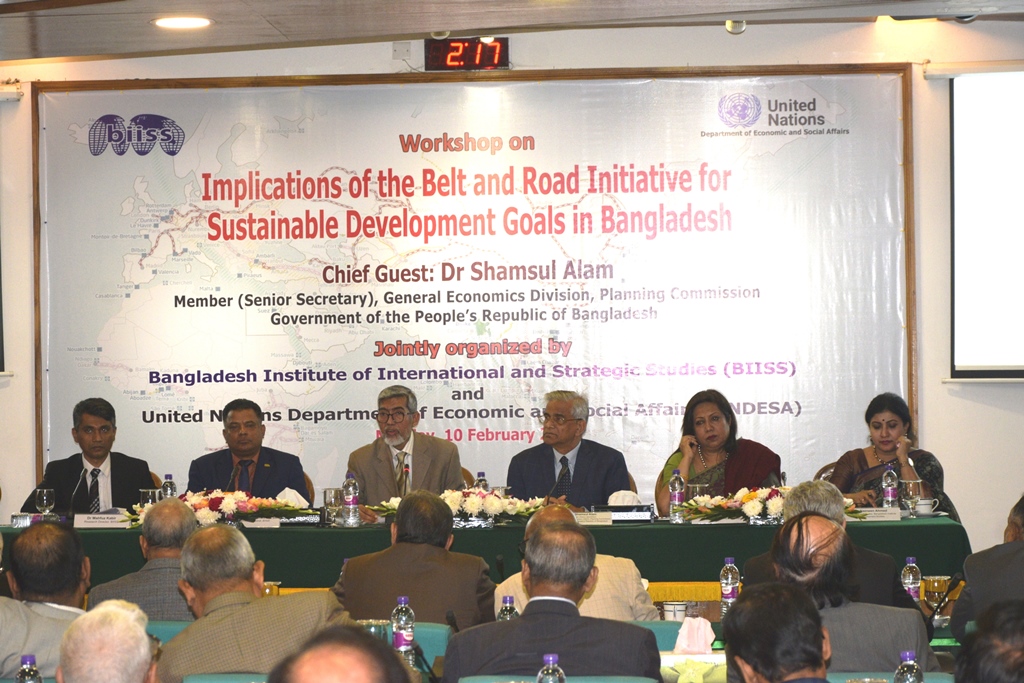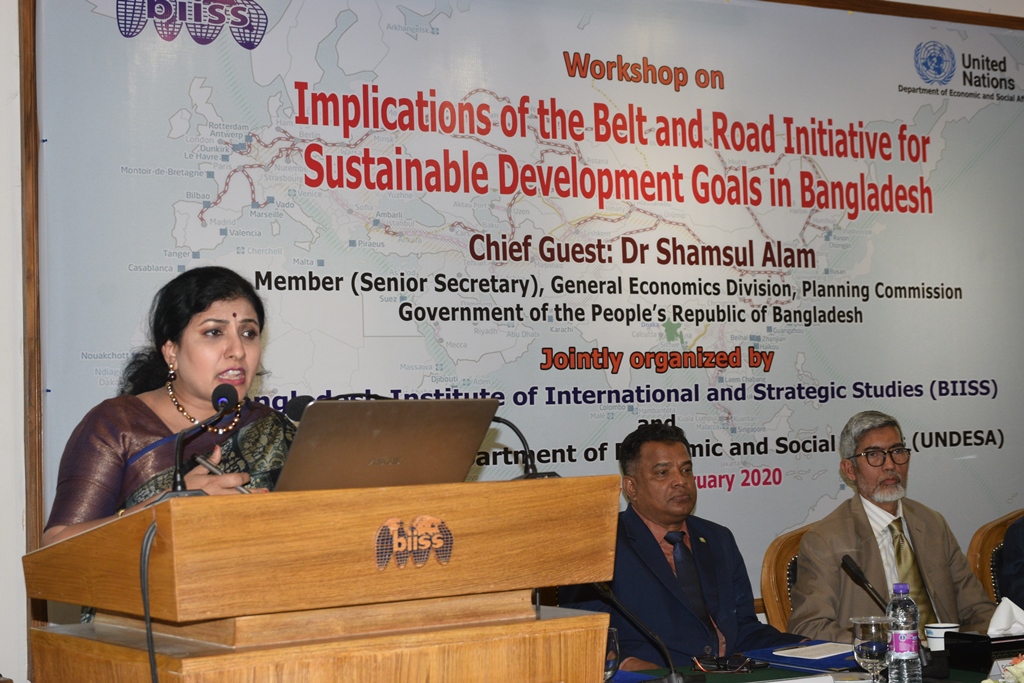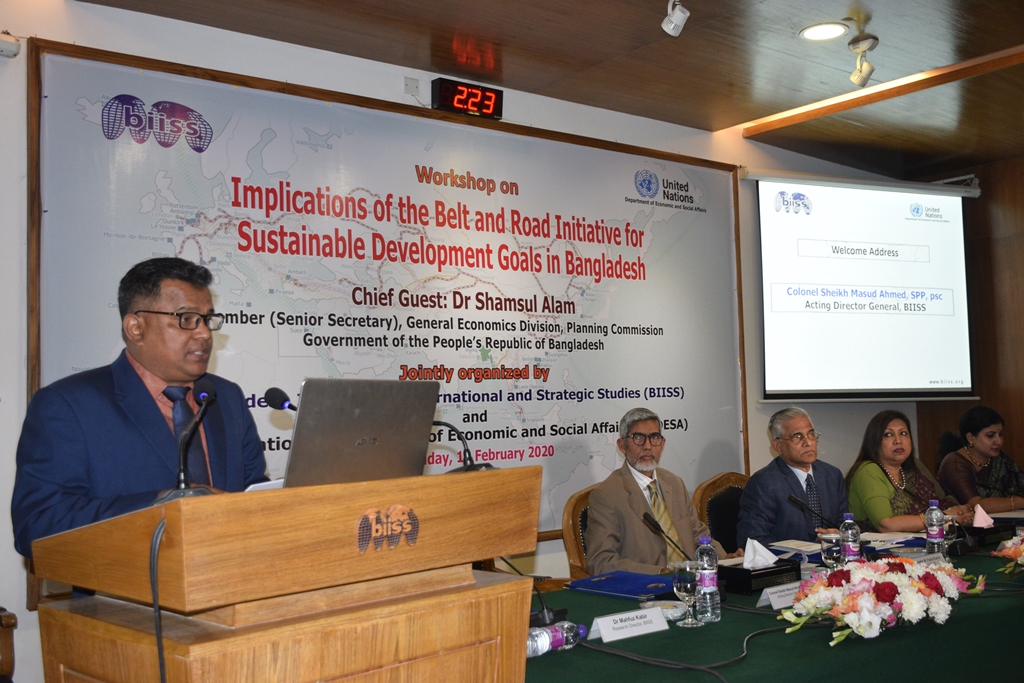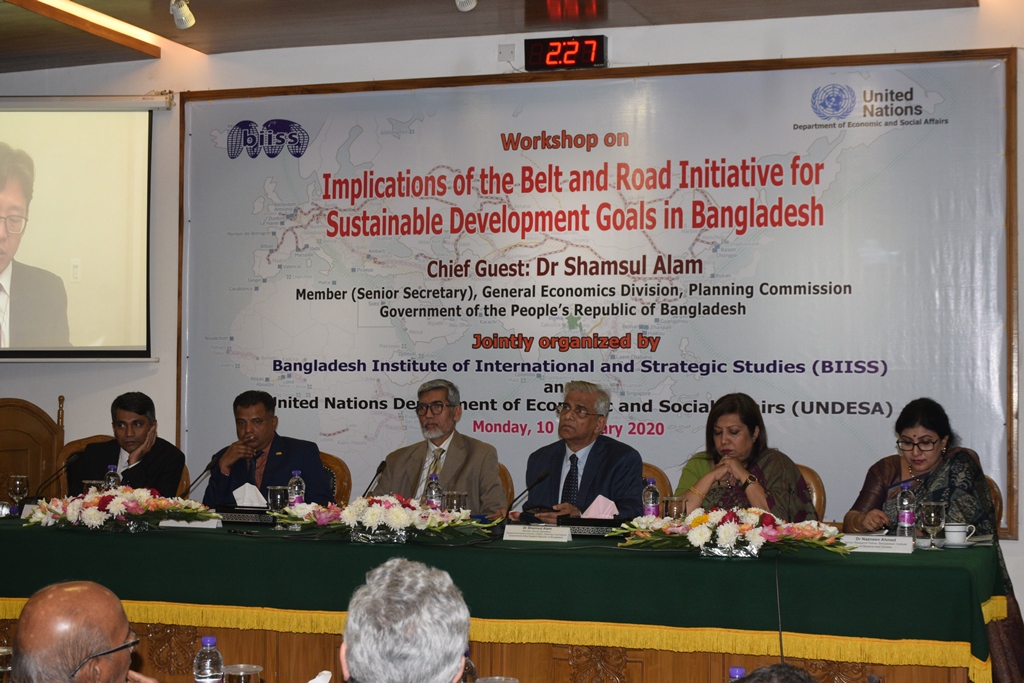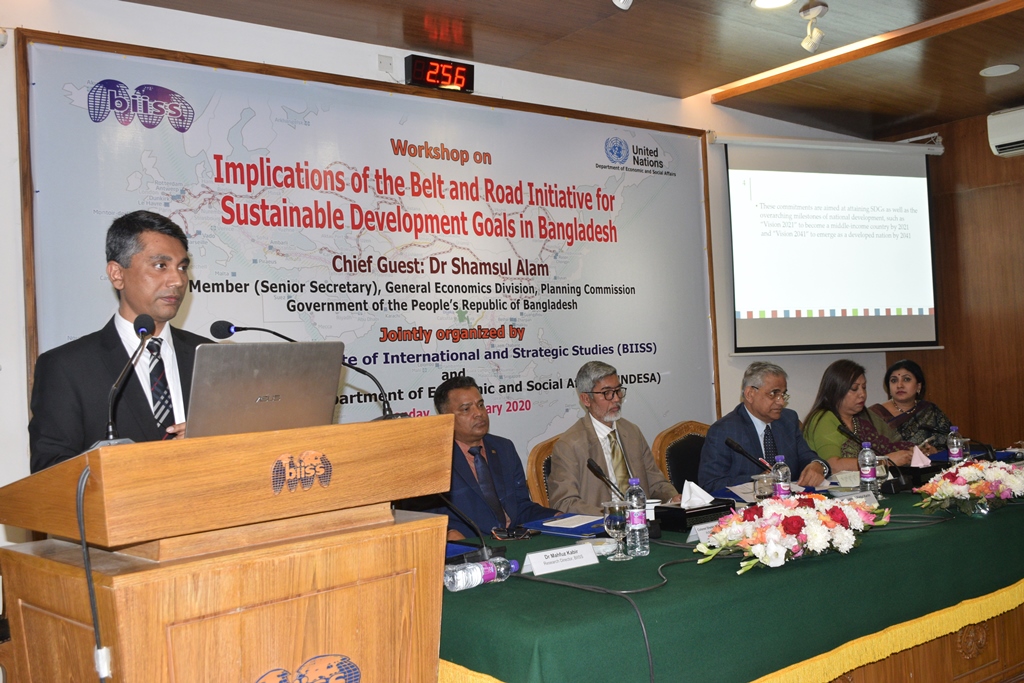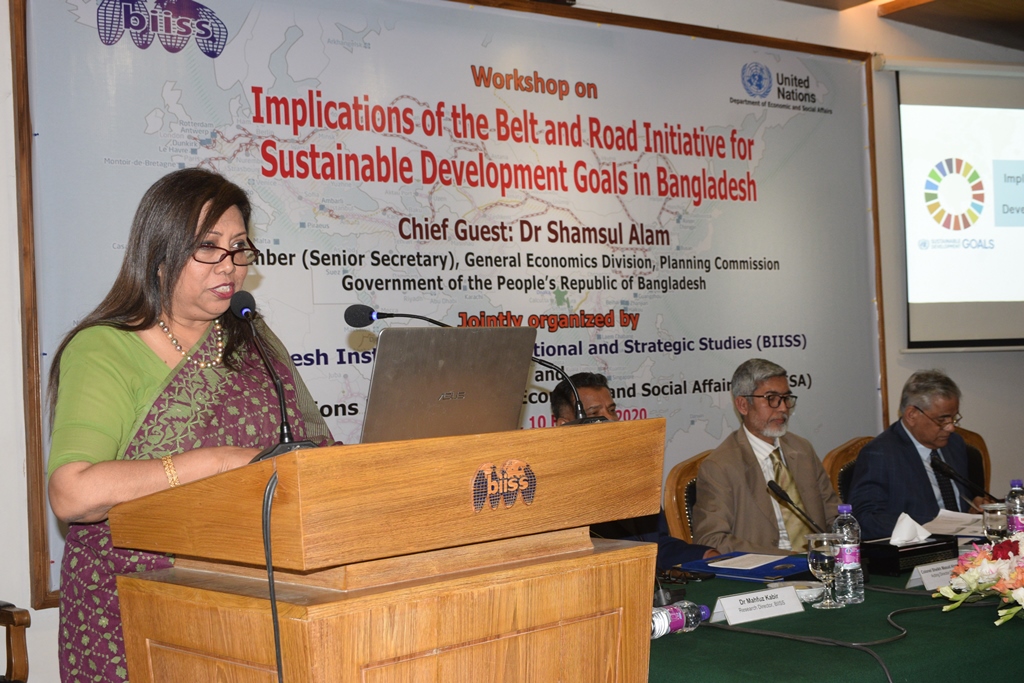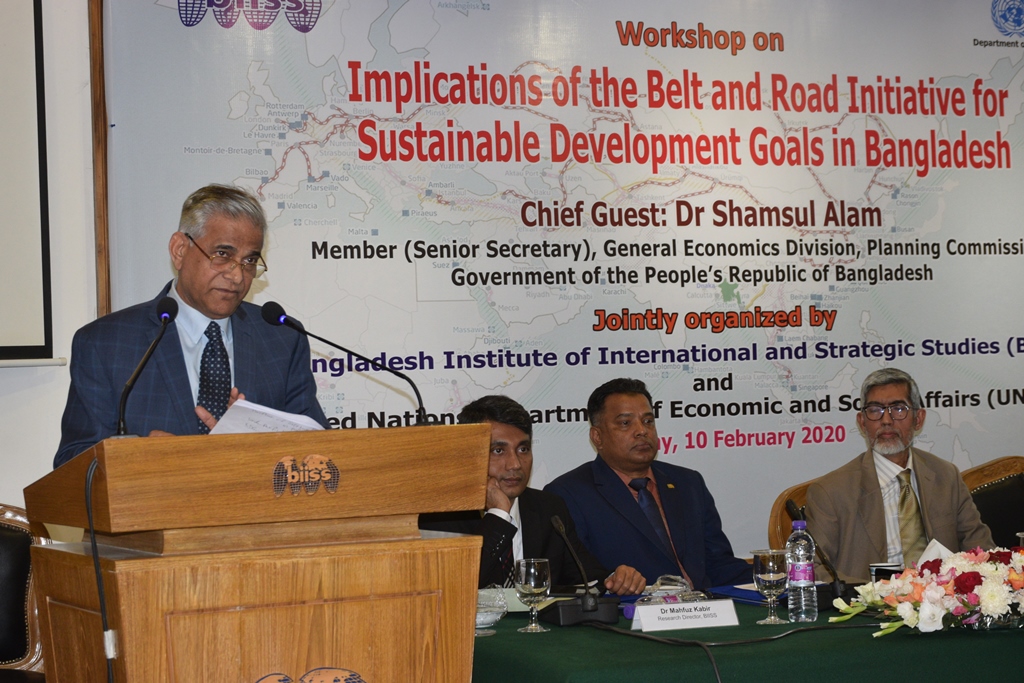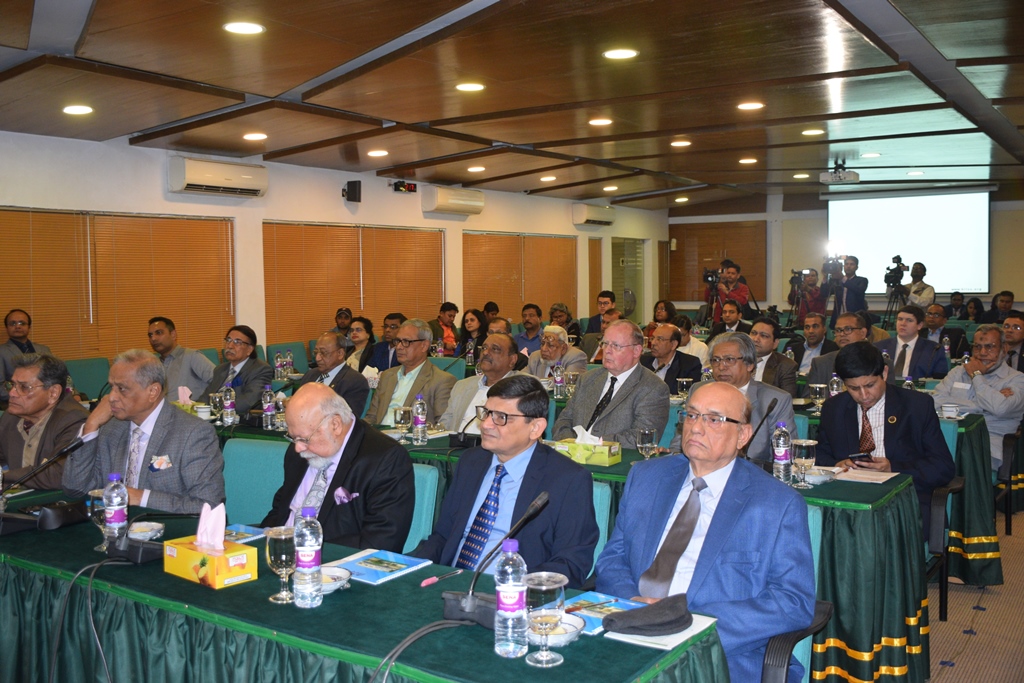Workshop on Implication of the Belt and Road Initiative for the Sustainable Development Goals in Bangladesh on 10 February 2020
DATE: 2020-02-10
Bangladesh Institute of International and Strategic Studies (BIISS) and United Nations Department of Economic and Social Affairs (UNDSEA)
Bangladesh Institute of International and Strategic Studies (BIISS) and United Nations Department of Economic and Social Affairs (UNDSEA) jointly organized a workshop on “Implication of the Belt and Road Initiative for the Sustainable Development Goals in Bangladesh” on 10 February 2020 at BIISS. Dr Shamsul Alam, Member (Senior Secretary), General Economics Division, Planning Commission, Government of the People’s Republic of Bangladesh graced the workshop as the Chief Guest. Ambassador M Fazlul Karim, Chairman, BIISS chaired the workshop.
Colonel Sheikh Masud Ahmed, SPP, psc, Acting Director General, BIISS, and Dr Namsuk Kim, Projects Coordinator, UNDESA, New York delivered the welcome address.
In his speech, Ambassador M Fazlul Karim, Chairman, BIISS mentioned that BRI offers an opportunity for China to invest its huge foreign currency reserve while helping developing countries built their critical infrastructure. But in order to avoid debt trap, Bangladesh need to choose viable project with favourable interest rate and payment schedule.
Ms Lin Yang, Program Officer, UNDESA delivered a presentation titled “Potential Impact of the BRI on SDGs in Selected Asian Economies: Result from the Extended World Economic Forecasting Model”. In her presentation she focused on the impact that BRI can have in the growth of investment, GDP and productivity.
Dr Mahfuz Kabir, Research Director, BIISS delivered a presentation on “Implication of the BRI for the SDGs in Bangladesh”. After discussing Bangladesh’s achievements and challenges in SDGs related to BRI, Dr Kabir demonstrated that BRI can be an important instrument of cooperation for Bangladesh in the journey of achieving SDGs. For the successful implementation of BRI for achieving SDGs, the country may face some challenges. To overcome those challenges, Dr Kabir also suggested some policy recommendations.
After the presentations, distinguished panelists Dr Nazneen Ahmed, Senior Research Fellow, Bangladesh Institute of Development Studies (BIDS) and Ms Sultana Afroz, Additional Secretary, Economic Relations Division, Government of the People’s Republic of Bangladesh delivered their valuable remarks on the presentations. They noted that Bangladesh should concentrate on alternative livelihood opportunities for the displaced people who will be victims in the coming years because of mega projects. Discussants highlighted the importance of alternative options like regional and sub-regional cooperation alongside the BRI on a mutually beneficial manner. They put emphasis on identifying ways to improve gender equality through BRI. They also informed that Bangladesh has developed cooperation with Beijing based on BRI where the key focus areas are- infrastructure, economy and digital financial inclusion.
Chief Guest of the workshop Dr Shamsul Alam mentioned that Bangladesh became member of the BRI in 2016 following a visit by Chinese President Xi Jinping. This membership is aimed at attaining SDGs and achieving national development marks such as becoming a middle-income country by 2021 and to emerge as a development nation by 2041. He said that Bangladesh needs to construct a lot more of infrastructures to become a developed country. There is a need of substantial investments for infrastructure, human development, containing climate change hazards. He also pointed out that Bangladesh has no risk of falling into the debt trap of Chinse loans as cautioned by many economists. The GDP of Bangladesh is fast growing. The budget deficit is below 5 per cent which is less than that of India, Pakistan and Sri Lanka. If debt-GDP ratio is raised from 65 to 70 percent of GDP, it will not affect the macroeconomic balance of the country.
In the open-discussion session, the commentators pointed out different queries regarding the opportunities and challenges of implementing the BRI projects. All of them emphasized on the issue that greater focus must be given on attracting the Chinese investors and increasing the chances of larger exports in the Chinese market. Given this is China’s flagship project, they suggested that Bangladesh should try to get the maximum benefit by utilizing the initiative. Prospects of getting expertise of renewable energy and the importance of oceanography and ocean-oriented researches also came up in the discussion. The participants pointed out both traditional and non-traditional threats that may hamper the BRI projects, including the very recent outbreak of the Coronavirus. Finally, the open-session also took into account the global and regional power dynamics as well as the future of the BRI vis-á-vis the Indio-China and the US-China rivalries.
Senior officials from different ministries, ambassadors and high commissioners, senior civil and military officials, media, academia, think tanks, business personalities, students and teachers from different universities participated in the open discussion session and raised their valuable questions and opinions.

